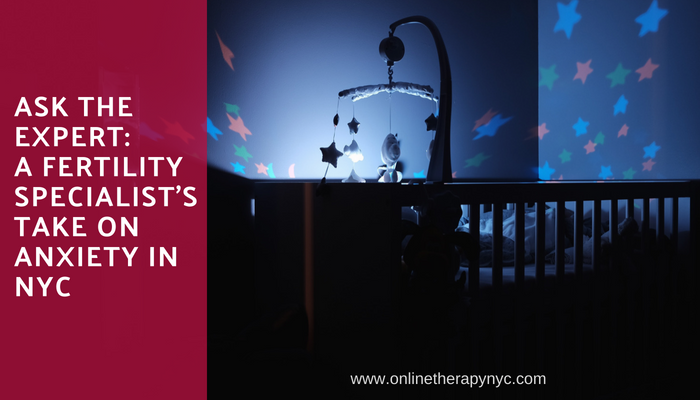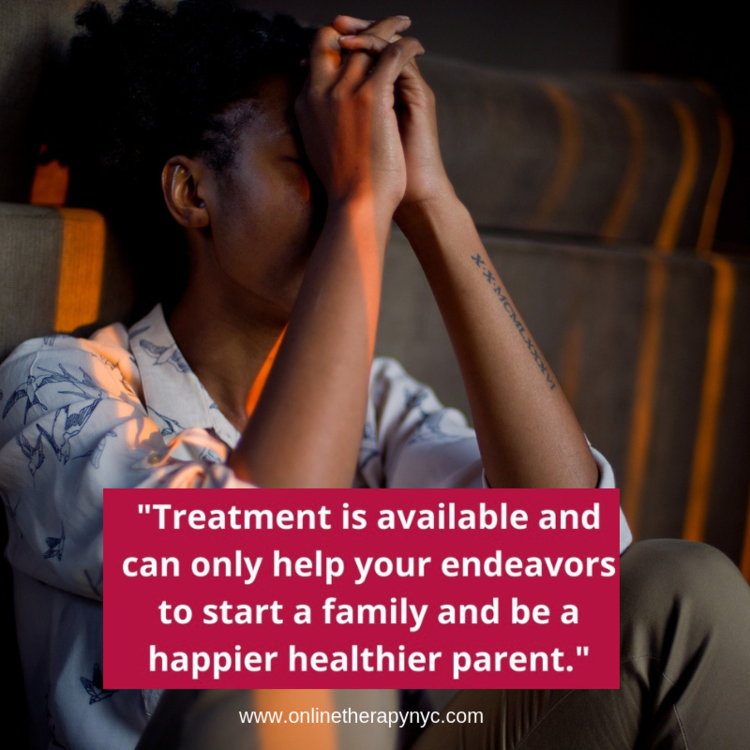Ask the Expert: A Fertility Specialist’s Take on Anxiety in NYC
Anxious about when you will be able to start a family or whether you even should?
Many of the patients we work with in NYC are powerful, dynamic, successful people in their 30s and early 40s whose focus has been career-building and who have significant anxiety about whether and when they will have an opportunity to have a family of their own, or whether they even want to at all. There are just so many factors to consider, from unconscious but influential messages internalized throughout life about parenthood to rigid ideas about the “right” way to go about constructing a family to finances, and so much more. Often, the work of uncovering all of those pieces can take time – time that a person in their 30s or 40s may feel they do not have because of anxiety around an impending end to their fertility. When these questions begin to arise in therapy, one of our first recommendations is that the person consult with a fertility specialist as soon as possible so that they can learn about their options in reality, rather than just what they fear may be the case based on what they’ve heard from friends or family or Doctor Google. Having tangible information about one’s current reproductive capacity, as well as about what the various fertility options entail, can liberate people from a dark, scary mystery so they are free to explore the other pieces of the puzzle involved in making decisions about family-building.
What does an expert have to say about anxiety and fertility?
Dr. Sheeva Talebian of CCRM New York
Erin McMaugh Tierno, founder of The Keely Group, recently talked with Dr. Sheeva Talebian, a NYC fertility specialist, about some of the most common questions in therapy at the intersection of anxiety and fertility.
Dr. Talebian is a founding partner of the CCRM New York Fertility Clinic. She was named a 2018, 2021, and 2023 Castle Connolly Top Doctor in Reproductive Endocrinology and Infertility, was named a 2019 New York Super Doctor, a Castle Connolly Exceptional Woman in Medicine in 2020, and named in 2021 New York Magazine’s Top Doctors. Dr. Talebian is also a co-founder of East Meets West Fertility, a content-based media site dedicated to women’s reproductive health, and co-produces Truly MD, a very accessible “real talk” website and e-newsletter dedicated to providing information about women’s reproductive health from the perspective of physicians.
Q: What effects are you seeing anxiety have on fertility patients in NYC in general?
A: I see anxiety manifest in many different ways in my patient population. In general, NYC can be a difficult place to live. There is CONSTANT activity. It is loud and busy. A simple commute to work or a social engagement can be stressful. There is also pressure financially and socially. Adding fertility struggles on top of our baseline stress can be overwhelming to put it mildly. The worst impact of stress that I see, is when it impedes women/couples from coming in to seek treatment or it leads to them stopping treatment before achieving success. I often say, resilience is the most important factor when predicting the success of fertility treatment.
Q: Is there anything about living in NYC that you believe specifically impacts levels of anxiety?
A: As I describe above, I think in NYC EVERYTHING moves faster. Getting around the city can be stressful. We don't have the same access to fresh air and nature. Sometimes finding a quiet space can seem impossible. I think the constant stimulation that we face as New Yorkers adds a layer of stress that [people] in other cities and towns do not have to face (or at least to the same extreme).
Q: How do you see anxiety showing up in the fertility clinic/reproductive medicine office?
A: Anxiety can present as illness, weight loss, weight gain, sleep disturbance, depression, anger – I can go on…
Q: What are you looking for in your patients (or their partners, if applicable) that would lead you to suggest they seek anxiety treatment?
A: When I sense that feeling of defeat in a [person]/couple, I often offer referrals for additional support – specifically a mental health specialist. When [people] are complaining of an inability to sleep well, lack of happiness, anger and frustration – I also give referrals.
Q: What specific concerns do you have about anxiety, either cause or effect, for people considering or navigating:
Egg freezing
A: Anxiety may be the reason a [person] who wants to egg freeze does not. [People] who are candidates to egg freeze (not yet in a relationship but desire children, for example) often have anxiety about their status. They often say, "I never thought that I would ever be in this situation." They tell me that it took them months to make the appointment to see me. It makes me believe that there are so many more [people] who want to learn about egg freezing but are too anxious to come in for the consult and as a result, never pursue this route.
Trying to Conceive (“TTC”)
A: We often spend much of our reproductive years avoiding pregnancy but once the decision is made to start a family, the desire often becomes intense and we want immediate/instant results. When pregnancy does not occur in the first few months, anxiety just continues to build with each progress[ing] month. Many [people] tell me "my mother says if I just relax I will get pregnant" – I hear this type of comment often. But for any of you [who] have started TTC and it doesn't happen in your expected time frame, relaxing is NOT easy. Anxiety is rarely the sole cause of infertility, but it certainly does not help and can compound other issues. So, if you are TTC – I would recommend measures to decrease anxiety (meditation, exercise, therapy, support groups).
Surrogacy
A: Surrogacy is a process that most people know very little about. It can also be stressful to "give up" the control you would have carrying the pregnancy yourself. I always recommend seeing a therapist to discuss the emotional aspect of surrogacy prior to making this decision.
Egg donation
A: As with surrogacy, the prospect of egg donation can be foreign and scary. I always recommend any woman/individual/couple seeking egg donation meet with a therapist well versed in this process to review all aspects surrounding egg donation. Even in couples/[people] who are certain this is the route for them, I still recommend at least one visit. It can only be a benefit to speak through the complexity of this process with a trained professional who has a background in "third party reproduction" (donor egg/sperm, surrogacy).
Same sex reproduction
A: Many decisions [need to be made] with same sex reproduction – whose eggs? whose uterus? and sperm? Speaking with a trained specialist can help you navigate some of these questions – along with meeting with a specialist who can do medical evaluations and provide resources to make these decisions.
Single parenthood by choice
A: Obviously this is an important decision that can be very anxiety provoking. A support system is imperative when making the decision and during the process of getting pregnant and postpartum. Again, I would recommend meeting with a therapist who specializes in single [parent]hood to help you navigate the decision and emotional aspects.
Chronic miscarriage
A: Each miscarriage is a loss. With each loss, stress/anxiety/depression increases. [Individuals] and couples who undergo chronic miscarriage need as much support as possible. Your doctor can help evaluate the underlying cause and recommend treatments to improve your chances. A mental health specialist can help provide the emotional support needed to continue trying.
Secondary infertility (infertility after a successful pregnancy and delivery)
A: [People] who have [had] no issues conceiving in the past are often taken by surprise when they have trouble for a 2nd or 3rd child. This can add stress and anxiety to your relationship and take emotional energy away from the child(ren) you already have.
Q: What about for partners of people who are TTC (or any of the above)?
A: The partners should not be forgotten. It can be very difficult if it is not your body that may be miscarrying or failing to get that + pregnancy test. It is important for partners to also be acknowledged as the patient and offered support.
Q: How do you consider anxiety medication as part of a treatment plan when working with a person who is TTC?
A: If you are under the care of a psychiatrist who believes you will benefit from medications, I support that plan. Most anxiety/depression medications are safe to take when TTC and even during pregnancy. Just be sure to share your pregnancy attempts/plans with your physician.
Q: Is there anything else about anxiety that is not covered above and is related to your practice of reproductive medicine that you want to discuss?
A: There is no reason to suffer. If you feel anxiety/depression are negatively impacting your quality of life, please share this with a doctor, nurse or other healthcare provider that you feel comfortable with. Treatment is available and can only help your endeavors to start a family and be a happier healthier parent.
There is no reason to suffer. Reach Out for Anxiety Therapy in NYC Today.
From Dr. Talebian’s perspective, anxiety can arise in and impact many different parts of the fertility journey. Taking steps to recognize, treat, and manage anxiety can be crucial in a family-building plan.
If you are wondering about your own anxiety and how it might intersect with your reproductive health or family plan, please contact us to schedule a free 20-minute consultation where we can discuss whether anxiety treatment might be one of your next steps.
Please click here for more information about how The Keely Group therapists help people navigate fertility and family building.
Read through our FAQ page to answer any lingering questions you may have.
Fill out our convenient online contact form to get in touch with our team.
Begin dating with more confidence and understanding!
Other Online Mental Health Services Offered at The Keely Group in New York City.
In addition to Fertility Therapy, The Keely Group offers a wide variety of online services to fit the needs of busy professionals. We understand that you may face other challenges throughout your daily life that can affect relationships and dating, so we offer online therapy services to help you cope with these issues. Our ultimate goal is to help you streamline your life and that's why we offer an array of services such as:







